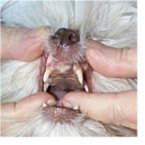Types of canine cancer
"Medical dog treatments"

Just like in people, the types of canine cancer are many. Surprisingly, dogs are diagnosed with cancer at the same rate as their human companions despite their shorter lifespan.
Some types of canine cancer can be cured while others can only be managed. All cancers start the same, as an abnormal growth of cells called a neoplasia.
The actual growth itself, the tumor or mass, is called a neoplasm. The thing to remember though is that not all neoplasms are cancer. Some neoplasms may be benign (non-cancerous) while others are malignant (cancerous).
Only when the neoplasm is diagnosed as malignant is it considered cancer. Typically, the types of canine cancer diagnosed are named for the area that the cancer has affected. The most common types of canine cancer are grouped as follows:

Some types of cancer in dogs
Skin: Mast Cell Tumors - a type of canine cancer found on and under the skin of dogs, commonly found in older dogs. Mast cells are specialized cells that deal with inflammation and allergies. Most common sites include the skin, spleen, liver and bone marrow.
Head and Neck: Squamous Cell Carcinoma involves a type of cancerous skin cell that is capable of infiltrative growth, spread to lymph nodes and distant metastasis. Most common sites include the oral cavity, eyelids, nasal cavity, lips, and the thyroid gland.
Mammary Gland (Breast): Adenoma, Carcinoma, adenocarcinoma Rare in spayed females and males, this type of cancer affects 1 in 4 of unsprayed females over the age of 4.
Bone: Canine Osteosarcoma accounts for approximately 80% of bone cancer tumors in dogs. It is most often seen in giant and large breed dogs and dogs older than 7 years.
Lymphoma: Malignant lymphoma or lymphosarcoma is a large group of cancers that are classified according to their point of origin in lymph tissue, such as: lymph nodes, spleen, liver, and bone marrow. Usually affecting middle age to older dogs, lymphoma is not isolated to this group or any particular breed or gender.

These types of cancer are just a few of the most commonly diagnosed. It can be a confusing and heart wrenching time when you hear those terrible words.
But remember the most important aspect of your furbabies care is his or her comfort. Consider your pet’s quality of life and the likelihood of cancer recurrence when determining treatment.
For some, cost also plays a role in the decision process due to the high cost of some surgeries, continued chemotherapy and radiation treatments. Most importantly make the most of your final hours, days or weeks with your beloved pet.
Canine Kids
Types Of Canine Cancer to Dog Health Info











